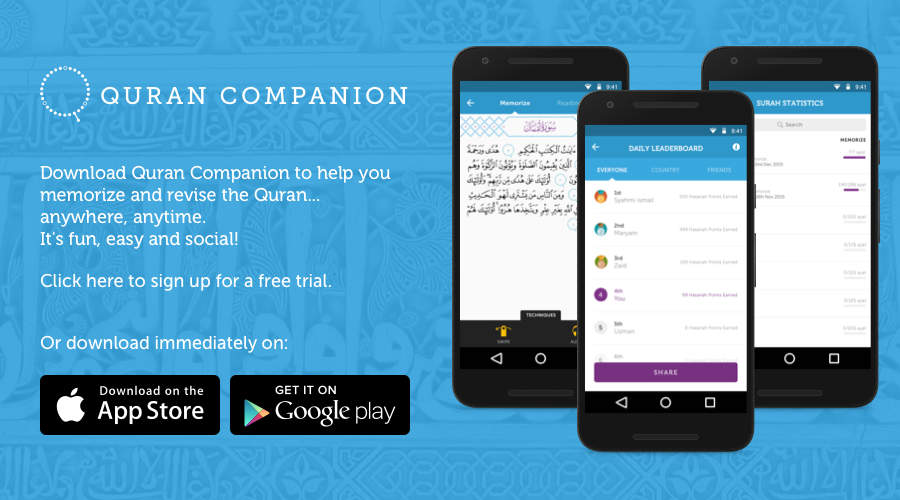I memorized the entire Quran almost 17 years ago, but it wasn’t a smooth-sailing experience.
I’ve learned a lot through experience, and I’m now here to share with you the best Quran memorization tips that worked for my busy lifestyle, and Insha’Allah they will help you reach your Quran memorization goals too.
Tip #1:
Understand that Quran Memorization is a lifelong journey.
Many people think that once you’ve finished memorizing the Quran, all the hard work is done. This is a myth. Retaining what you’ve memorized is a lifelong journey and if you don’t consistently review your memorizations, it will slip away.
Abu Musa narrated that our beautiful Prophet Muhammad (SAW) said:
“Keep on reciting the Quran, for, by Him in Whose Hand my life is, Quran runs away (is forgotten) faster than camels that are released from their tying ropes.”
~ Sahih Al-Bukhari
In your intention to memorize the Quran, embrace the mindset that it will be a lifelong journey with the word of Allah SWT, so enjoy it :).
Tip #2:
Start small to build a Quran memorization habit & focus on weekly goals
Many folks start out with really big goals such as, “I want to memorize Surah Al-Baqarah” or “I want to memorize Surah Al-Kahf”. Masha’Allah these are really great goals.
However, for the beginner, it’s crucial to first build a memorization foundation before memorizing some of the longer Surahs.
I would highly recommend you pick one Surah that you’ve always wanted to memorize. If you are just starting out on your journey, I would advise you to pick a smaller Surah — perhaps something from the Juz 29 or 30.
Let’s say you want to memorize Surah Al-Mulk, which is roughly 2.5 pages long. You need to start off small and be realistic. Be honest with yourself in regards to how much you can memorize on a weekly basis. Try these steps to begin:
- Set a very small weekly goal (e.g. memorizing 3 ayahs of Surah Al-Mulk). Don’t worry about memorizing the ENTIRE SURAH yet. Make sure to achieve your weekly goals on a consistent basis FIRST.
- After achieving your small weekly goal for a few weeks, slowly increase your weekly goal (e.g. 5 ayahs per week).
- Remember to review what you’ve memorized on a weekly basis. You can review them in your solah, while driving to work, before your sleep, etc to make sure you retain what you’ve learned.
- Make sure to celebrate each time you achieve your weekly goals! #Alhamdulillah 🙂
- You don’t have to memorize everyday. You can take 2 or so days off as long as you ACHIEVE your weekly goals.
Keep in mind that Quran memorization is not a one-size fits all model. Not everybody can memorize a few pages or even half a page per week. Stick with what you can realistically memorize per week and slowly increase your goal, Insha’Allah.
Don’t overstretch yourself and make sure you initially keep your weekly goals really small and achievable. You’ll eventually get super motivated once you start accomplishing your weekly goals in a consistent fashion.
Tip #3:
Double down on Quran memorization techniques that work best for you
 People around the world memorize Quran utilizing different methods. During the Prophet Muhammad SAW’s time, the Quranic words were written on leaflets and people conversed in Fusha as well, which is the language of the Quran.
People around the world memorize Quran utilizing different methods. During the Prophet Muhammad SAW’s time, the Quranic words were written on leaflets and people conversed in Fusha as well, which is the language of the Quran.
Eventually, the Quran was compiled into the Mushaf Uthmani and people around the world utilized rote memorization to memorize Quran. Fast forward many many years later, audio recording emerged and people were absolutely amazed with the audio recording of the Athan in Makkah. Shortly after, the famous Qari reciters were asked to record their recitation of the entire Quran!
When people heard these recitations, some people were able to pick up on the melody and realized they were more auditory learners, and so they utilized this method to memorize Quran.
Simultaneously, you had folks in parts of the world such as Mauritania and other West African neighbors, whereby the students of Quran write the ayahs on a wooden tablet to assist with their memorization & retention Subhan’Allah!
As time has evolved, people realized that certain memorization techniques work really well for them. Some students memorize more effectively in early mornings while others can memorize much better at night.
Again, it’s not a one-size fits all model. You have to figure out what works best for you – rote memorization, audio, writing, a combination, etc. Experiment with the multi-sensory memorization techniques in the Quran Companion app to see what works best for you.
When you learn what works really well for you, double down on that approach to improve your memorization, Insha’Allah!
Related: Quran Memorization Tips for Auditory Learners
Tip #4:
Don’t stress out too much when you make mistakes
Don’t stress out too much if you get so many mistakes.
After completing the memorization of the entire Quran almost two decades ago, I realized one simple fact: Every single memorizer/reviser makes mistakes no matter how many times he/she has revised the Quran.
Everybody needs to come to terms with this reality. Don’t beat yourself too much if you’ve been revising for several years and you still find yourself making a lot of mistakes. It’s okay.
For some reason there’s this negative stigma around making a lot of mistakes, as if it means you are failing miserably. That’s not true at all. You will make mistakes. Don’t let it get you down. Just make sure you work hard to minimize mistakes and know that Allah SWT rewards on effort 🙂
Tip #5:
Revision is the key to success
Revision is the key to memorizing Quran!
Many times people start memorizing more and more verses from the Quran. However, around 95% of the time, people end up quitting.
What happens is that people focus only on memorization and not revision. They put in massive effort to memorize many Ayahs but unfortunately, they can’t really recall them. When that happens, a person gets highly discouraged and he/she feels like they can never memorize Quran.
Don’t worry we all go through this phase. In fact, when I ‘finished’ memorizing the Quran around 17 years ago, I forgot many Surahs from the Quran. I didn’t focus on revision at all and as a result, I wasn’t technically a Hafidh (Hafiz). It was only after I worked on revision was I able to become a Hafidh, with Allah’s permission.
If you’re always on the go, try using Quran Companion as a revision tool to help you stay on track. Many people find the audio looping function as a great way to help them with revision, and you can also try the upcoming recording feature to help you revise.
Related Video: Quran Memorization Tips for Buys People
>>> Form a meaningful relationship with the Quran in as little as 10 min/day. Learn more.
Yes, YOU can do this, even if you’re busy!
As a former financial analyst and now as an entrepreneur, I have very busy days. These simple tips don’t require big chunks of time. It’s just a matter of intention and consistency, no matter how big or small your goals are.
It’s very possible to memorize the Quran as long as you stay disciplined and use the right techniques. Allah SWT says in the Quran:
“And We have certainly made the Qur’an easy for remembrance, so is there any who will remember?”
~ Quran 54:17






Google
Please go to the websites we adhere to, such as this a single, as it represents our picks through the web.